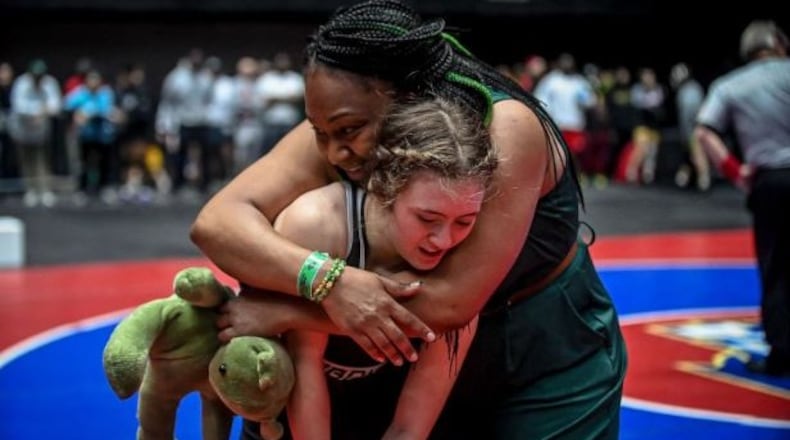In ninth grade Jordan Epstein made an agreement with her dad to try out wrestling after playing softball for three years. She felt wrestling offered her a new chance to develop herself.
“When I came into it, it was very welcoming and everyone just treated me like family,” Epstein said.
Epstein immediately felt the warmth from the team at Greenbrier High School near Augusta, and now after completing her junior season, she says she has loved every second.
The Georgia High School Association sanctioned girls wrestling in 2018. Across the state, roster numbers increased by over 200% from 2018-22. Fourteen 14 different weight classes and team duals wrestling championships were added during the 2022-23 school year to encompass the rapid growth.
Many high school girls in Georgia, like Epstein, are falling in love with wrestling and want to continue in college. But many struggle to find a college with their desired academic field. Although girls wrestling is growing fast at the high school level, few Division I programs have added the sport.
The growth at Georgia high schools comes thanks to many factors.
Both coach Donnell Bradley of Greenbrier High School and coach Allen Newton of Carrollton High School said their current team members recruit their friends. Also, Newton said he has been successful in recruiting girls from sports like lacrosse, soccer and competitive cheering.
Carrollton placed first at the inaugural girls’ team duals wrestling state championship in March.
Greenbrier, which placed third, competed with crossover athletes at the 2023 wrestling championships. Epstein, Kaylynn Hottenrott and Ryan Lewis qualified for state by placing top five at sectionals - and all had spent most of their early years playing other sports.
Epstein and Hottenrott came from softball careers while Lewis was a swimmer. Epstein said the transition from softball to wrestling was smooth.
“The team was very accommodating,” said Epstein. “So you learn all the new stuff in the beginning weeks, and then you slowly get faster and do harder stuff. Even though it’s two different sports, I feel like it’s easier to pick up on and especially for girls wrestling, where you have a lot of new girls coming in, in high school. They (coaches) know that so they can accommodate to that.”
Epstein, Hottenrott, and Lewis are all interested in wrestling in college.
“I want to wrestle in college but I’m not completely settled on what I want to do,” said Hottenrott. “So it all depends on if I can find a school with whatever I want to do when I’m older, that also has a good wrestling program.”
Epstein dreams of becoming a doctor, and hopes wrestling in college could offer her a pathway to incurring less debt. Lewis, however, is having a harder time finding a college that meets her academic and athletic interests.
“I would like to be an engineer,” said Lewis. “But I haven’t really found a school that offers a good engineering program and wrestling program.”
Currently, there are 68 NCAA programs, composed of 40 Division III programs, 24 Division II programs, and four Division I programs, according to American Women’s Wrestling. The National Association of Intercollegiate Athletics (NAIA) fields 42 women’s wrestling programs.
Jackie Paquette, Deputy Director of the National Wrestling Coaches Association, attributed the number of NAIA programs to their enrollment driven purposes.
“A lot of smaller institutions utilize athletics as an enrollment driver to get the enrollment number they need,” she said.
Life University, a NAIA program in Marietta, started a women’s wrestling program in 2014. Recently competing in the first-ever 2023 NAIA Women’s Wrestling Championship, the Running Eagles placed second.
Life University coach Ashley Flavin said the addition of a women’s wrestling team improved their college community. The overall athletic department GPA increased due to the varsity wrestling squad’s 3.7. Match attendance and fan engagement with women’s wrestling also increased due to Life’s recent success. Life has been ranked first or second in the NAIA coaches’ poll for the past two years.
But larger colleges do not experience the same need for enrollment to stay alive, so there are less women’s wrestling programs, Flavin said.
Girls wrestling is one of the fastest growing sports in not only Georgia, but America. According to the National Federation of State High School Associations, for the past five years, the sport has grown faster than any other.
But will larger colleges follow this development and start adding women’s wrestling programs to their athletics programs? Currently Presbyterian College, Sacred Heart University, Lindenwood University and University of Iowa are the only Division I programs offering women’s wrestling. University of Iowa became the first Power Five school to add the program in 2021.
Many athletes like Epstein, Hottenrott and Lewis hope that colleges continue adding wrestling programs to their athletics to fulfill both their dreams on and off the mat.
“Eventually I want to be a state champion,” said Epstein. “Then go off to college and do great things. I just want to make sure that I’m good all around.”
Lauren Smith is a student in the University of Georgia’s Carmical Sports Media Institute.
About the Author
The Latest
Featured

